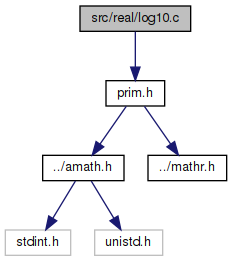Base 10 logarithm function. More...
#include "prim.h"
Include dependency graph for log10.c:

Go to the source code of this file.
Functions | |
| double | log10 (double x) |
| Base 10 logarithm function. More... | |
Variables | |
| static const double | two54 = 1.80143985094819840000e+16 |
| static const double | ivln10 = 4.34294481903251816668e-01 |
| static const double | log10_2hi = 3.01029995663611771306e-01 |
| static const double | log10_2lo = 3.69423907715893078616e-13 |
| static double | zero = 0.0 |
Detailed Description
Base 10 logarithm function.
Definition in file log10.c.
Function Documentation
◆ log10()
| double log10 | ( | double | x | ) |
Base 10 logarithm function.
Method:
Let log10_2hi = leading 40 bits of log10(2) and
log10_2lo = log10(2) - log10_2hi,
ivln10 = 1/log(10) rounded.
Then
n = ilogb(x),
if(n<0) n = n+1;
x = scalbn(x,-n);
log10(x) := n*log10_2hi + (n*log10_2lo + ivln10*log(x))
Note 1:
To guarantee log10(10**n)=n, where 10**n is normal, the rounding
mode must set to Round-to-Nearest.
Note 2:
[1/log(10)] rounded to 53 bits has error .198 ulps;
log10 is monotonic at all binary break points.
Special cases:log10(x) is NaN with signal if x < 0; log10(+INF) is +INF with no signal; log10(0) is -INF with signal; log10(NaN) is that NaN with no signal; log10(10**N) = N for N=0,1,...,22.
Constants: The hexadecimal values are the intended ones for the following constants. The decimal values may be used, provided that the compiler will convert from decimal to binary accurately enough to produce the hexadecimal values shown.
Definition at line 93 of file log10.c.
References ivln10, log(), log10_2hi, log10_2lo, two54, and zero.
Referenced by DecimalSystem::GetText(), and RealNumber::Log10().
#define GET_HIGH_WORD(i, d)
Get the more significant 32 bit int from a double.
Definition: prim.h:167
#define SET_HIGH_WORD(d, v)
Set the more significant 32 bits of a double from an int.
Definition: prim.h:198
Here is the call graph for this function:

Here is the caller graph for this function:

Variable Documentation
◆ ivln10
|
static |
◆ log10_2hi
|
static |
◆ log10_2lo
|
static |
◆ two54
|
static |
